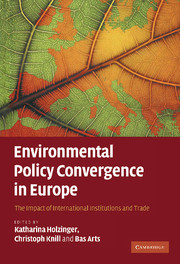Book contents
- Frontmatter
- Contents
- List of figures
- List of tables
- List of contributors
- Preface
- List of abbreviations
- 1 Introduction
- 2 State of the art – conceptualising environmental policy convergence
- 3 Theoretical framework: causal factors and convergence expectations
- 4 Research design, variables and data
- 5 Degree and direction of environmental policy convergence: analysis of aggregate data
- 6 The pair approach: what causes convergence of environmental policies?
- 7 The gap approach: what affects the direction of environmental policy convergence?
- 8 Conclusion
- Annex
- References
- Index
2 - State of the art – conceptualising environmental policy convergence
Published online by Cambridge University Press: 22 September 2009
- Frontmatter
- Contents
- List of figures
- List of tables
- List of contributors
- Preface
- List of abbreviations
- 1 Introduction
- 2 State of the art – conceptualising environmental policy convergence
- 3 Theoretical framework: causal factors and convergence expectations
- 4 Research design, variables and data
- 5 Degree and direction of environmental policy convergence: analysis of aggregate data
- 6 The pair approach: what causes convergence of environmental policies?
- 7 The gap approach: what affects the direction of environmental policy convergence?
- 8 Conclusion
- Annex
- References
- Index
Summary
INTRODUCTION
The study of policy convergence has received considerable attention both in comparative politics and in the field of international studies. Interestingly, both disciplines have approached the subject from opposite starting points and with differing methodologies. Whereas in the field of international studies theoretically derived expectations of an increasing similarity of states and political systems driven by economic or ideational forces constituted a dominant thread in the early convergence literature (for a comprehensive overview see Drezner 2001), comparative studies initially focused more on the explanation of empirically observed differences between national political systems and programmes (Lundqvist 1974, 1980). Only recently have the two research strands effectively merged into an integrated study of policy convergence that increasingly challenges the traditional boundaries between comparative politics and international relations.
In this chapter we first introduce the concept of policy convergence and explain how it relates to similar concepts like policy transfer, policy diffusion or isomorphism. In a second step we review the existing empirical research on environmental policy convergence both in comparative politics and in international relations. Based on this overview, and drawing more broadly on the general convergence literature, we systematise the major causes of policy convergence that have been identified in these studies. We distinguish between causal mechanisms which translate pressures at the international level into domestic policy change and, possibly, into convergence of domestic policies, and facilitating factors which operate at the level of individual countries or specific policies.
- Type
- Chapter
- Information
- Environmental Policy Convergence in EuropeThe Impact of International Institutions and Trade, pp. 7 - 29Publisher: Cambridge University PressPrint publication year: 2008
- 6
- Cited by

